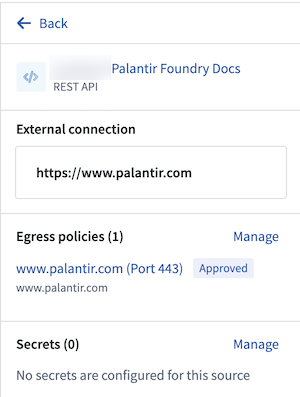Sources in Python environments
Foundry provides the ability to connect to external systems in Python environments across the platform. These capabilities include source-based external transforms, external functions, and compute modules ↗. This page discusses common use cases and workflows for external systems in Python environments. For more information, visit Palantir's external-systems ↗ open source library.
Source initialization is not included in any of the examples below, as this will vary between environments. To learn how to obtain an initialized source object, refer to the environment's (for example, a transforms repository, functions repository, compute module, etc.) relevant documentation on usage of sources. You may additionally find snippets in the source information panel side bar with instructions for usage.
HTTPS client
For REST-based sources, Palantir provides a preconfigured HTTPS client built on top of the Python requests library.
Note that sources must be initialized with only one HTTP connection; sources initialized with more or less than one HTTP connection are considered invalid and a preconfigured client will not be created.
If you attempt to create a connection with an invalid source connection configuration, you will receive an error Only single connection sources are supported.
To find out how many connections your source has, refer to the source's sidebar panel in the External connection section of your given environment, as seen in the example below:

Copied!1 2 3 4 5 6 7 8 9 10 11 12from external_systems.sources import Source, HttpsConnection from requests import Session my_source: Source = # Source is initialized differently based on the environment https_connection: HttpsConnection = my_source.get_https_connection() external_system_url: str = https_connection.url http_client: Session = https_connection.get_client() response = http_client.get(external_system_url + "/api/v1/example/", timeout=10)
Secrets
Source secrets can be referenced using get_secret("<secret_name>") on the source.
Copied!1 2 3 4 5from external_systems.sources import Source my_source: Source = ... my_secret: str = my_source.get_secret("SECRET_NAME")
Session credentials
A first-class method to retrieve and renew generated session credentials is available for some Foundry source types.
Supported source configurations
- S3: Cloud Identity, OIDC
- BigQuery: OIDC
Example: S3
Copied!1 2 3 4 5 6 7 8 9 10 11 12 13 14 15 16 17 18 19 20 21 22 23 24 25import boto3 from external_systems.sources import AwsCredentials, Refreshable, Source, SourceCredentials S3_BUCKET_REGION = <aws_region> S3_BUCKET_NAME = <bucket_name> s3_source: Source = ... refreshable_credentials: Refreshable[SourceCredentials] = s3_source.get_session_credentials() session_credentials: SourceCredentials = refreshable_credentials.get() if not isinstance(session_credentials, AwsCredentials): raise ... s3_client = boto3.client( "s3", region_name=S3_BUCKET_REGION, aws_access_key_id=session_credentials.access_key_id, aws_secret_access_key=session_credentials.secret_access_key, aws_session_token=session_credentials.session_token, ) s3_response = s3_client.list_objects_v2(Bucket=S3_BUCKET_NAME)
On-premises connectivity with agent-proxy egress policies
Foundry worker with agent-proxy policy sources allow connections in code to be established to on-premise systems as if the connections were made over the open Internet. For more details on how this is configured, refer to the agent proxy documentation.
Socket connections
For non-HTTPS connections to external systems that require connections through Foundry's agent proxy, a preconfigured socket is provided. Below is an example of using this socket with an on-premise SFTP server connection.
On-premise SFTP server example
This example uses the Fabric ↗ library.
Copied!1 2 3 4 5 6 7 8 9 10 11 12 13 14 15 16 17 18 19 20 21 22 23 24 25 26import fabric from external_systems.sources import Source from socket import socket SFTP_HOST = <sftp_host> SFTP_PORT = <sftp_port> on_prem_sftp_server_source: Source = ... username: str = on_prem_sftp_server_source.get_secret("username") password: str = on_prem_sftp_server_source.get_secret("password") proxy_socket: socket = on_prem_sftp_server_source.create_socket(SFTP_HOST, SFTP_PORT) with fabric.Connection( SFTP_HOST, user=username, port=SFTP_PORT, connect_kwargs={ "password": password, "sock": proxy_socket, }, ) as sftp_conn: sftp_client = sftp_conn.sftp() file_list = sftp_client.listdir(".")
Authenticated proxy URI
For more granular use cases, a pre-authenticated proxy URI is provided to allow connections to on-premises external systems.
Non-requests library example
In cases where the requests library client is not sufficient, you may need to use another HTTP client. This example uses the HTTPX ↗ library.
Copied!1 2 3 4 5 6 7 8 9 10 11 12 13import httpx from external_systems.sources import Source from typing import Optional agent_proxy_source: Source = ... authenticated_proxy_uri: Optional[str] = agent_proxy_source.get_https_proxy_uri() source_url: str = agent_proxy_source.get_https_connection().url with httpx.Client(proxy=authenticated_proxy_uri) as client: response = client.get(source_url + "/api/v1/example/", timeout=10.0)
Source properties
For source types that are available via the Foundry API, the configuration properties can also be directly accessed for use in code.
Copied!1 2 3 4 5from external_systems.sources import Source snowflake_source: Source = ... account_id: str = snowflake_source.source_configuration.get("accountIdentifier")